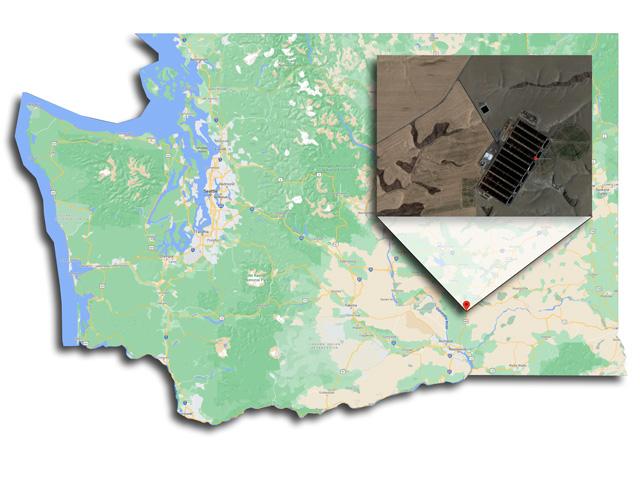Easterday Creditors to Get $11 Million
Bankruptcy Plan Confirmed for Easterday Ranch at Center of 'Ghost-Cattle' Scam
LINCOLN, Neb. (DTN) -- Chapter 11 bankruptcy proceedings for Washington-based Easterday Ranches and Easterday Farms are nearing completion as a federal bankruptcy judge on Tuesday confirmed an $11 million settlement with 65 creditors.
Cody Allen Easterday, former owner and operator of the eastern Washington operation, is facing up to 20 years in prison after a guilty plea on charges of defrauding Tyson Fresh Meats and another unnamed company of $244 million in buying and feeding hundreds of thousands of cattle that didn't exist.
In addition to the criminal court proceedings yet to be resolved, Easterday has been working with attorneys in the ongoing bankruptcy proceedings of his ranches and farms.
According to the bankruptcy settlement filed in the U.S. Bankruptcy Court for Eastern Washington, the McGregor Company, a crop inputs provider in the Pacific Northwest, is listed as the largest creditor on the Easterday farm side and is expected to receive about $4 million from the settlement. That is followed by John Deere Financial at $2.3 million and DLL Finance LLC at $1.4 million.
At this point, Rabo AgriFinance LLC is the lone holdout in finalizing the settlement.
Rabobank is trying to collect nearly $1.1 million owed it by Easterday. It is unknown whether Rabobank will hold up the settlement, as court records indicate the company is able to maintain its claim even if other creditors agree to the settlement.
The Easterday Ranches portion of the bankruptcy proceedings is ongoing, as Tyson is seeking more than $225 million in claims, and Washington real estate company Segale Properties has more than $25 million in outstanding claims.
About 18,000 acres of Easterday land was sold for $209 million at auction to AgriNorthwest, the investment segment of the Church of Jesus Christ of Latter-Day Saints.
Easterday's criminal sentencing was moved from June 13 to Sept. 19 after the U.S. District Court for the District of Eastern Washington granted an Easterday motion to continue. The former rancher asked for the delay to complete bankruptcy proceedings.
P[L1] D[0x0] M[300x250] OOP[F] ADUNIT[] T[]
In addition, the legal proceedings in a lawsuit filed by the Commodity Futures Trading Commission against Easterday have been stayed until Aug. 10.
Easterday pleaded guilty to wire fraud charges in a so-called "ghost cattle" scheme. Debtors including Tyson presented a plan to liquidate the assets of Easterday Ranches and Easterday Farms in an ongoing Chapter 11 bankruptcy case.
The CFTC sued Easterday as well, alleging his company violated the Commodity Exchange Act and CFTC regulations.
The CFTC's complaint stated Easterday amassed more than $200 million in losses during a 10-year period trading cattle futures on both his personal and business accounts. Easterday then admitted last fall that he had caused Easterday Ranches to submit invoices for cattle that never existed to cover millions of dollars in those trading losses.
The CFTC complaint sought restitution, civil penalties and permanent trading and registration bans on Easterday.
Easterday operated an extensive family farm operation in eastern Washington involved in cattle feeding as well as 22,500 acres of potatoes, onions, corn and wheat in the Columbia Basin.
Beginning in 2016 and continuing through November 2020, Easterday submitted false and fraudulent invoices and other information to Tyson and another company, according to court documents and the U.S. Department of Justice.
The Easterday Ranches Inc. owner received reimbursement from the companies for the purported purchase and raising of cattle the company never actually bought.
As part of the guilty plea to the criminal charge, Easterday also agreed to repay $244 million in restitution, according to the DOJ.
According to court documents, Cody Easterday used Easterday Ranches to enter into a series of agreements with Tyson and another company to purchase and feed cattle.
As part of the agreements, Tyson and the unnamed second company would provide funds for Easterday to buy and raise cattle.
After cattle were slaughtered and sold at market price, Easterday Ranches would repay the costs advanced and retain as profit the amount by which the sale price exceeded the sum repaid to Tyson and the second company.
Read more on DTN:
"Winning Bid on Easterday Assets: $209M," https://www.dtnpf.com/…
"WA Rancher Admits 'Ghost-Cattle' Scam," https://www.dtnpf.com/…
"Easterday Criminal Sentencing Moved," https://www.dtnpf.com/…
Todd Neeley can be reached at todd.neeley@dtn.com
Follow him on Twitter @DTNeeley
(c) Copyright 2022 DTN, LLC. All rights reserved.






